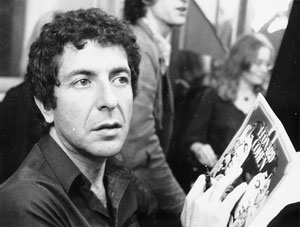<p style="text-align: justify;">You may know Leonard Cohen for his deep, enchanting music. His voice draws you in, and his lyrics are soulful and meaningful. But on top of his wildly successful musical career, Cohen has made a name for himself in the literary world as a poet and a novelist. It’s time we take a look at the thought-provoking literature of Leonard Cohen, winner of the 2011 Prince of Asturias Award for literature.</p>
<p style="text-align: justify;">Cohen began publishing his poems while attending McGill University in Montreal as an English major at the young age of 17. During his time at McGill, he was the president of the McGill Debating Union, further sharpening his verbal skills. Cohen’s first poems were published in the literary magazine, <em>CIV/n </em>in 1954. Despite his mediocre grades, Cohen earned the McNaughton Prize in creative writing during his collegiate years.</p>
<p style="text-align: justify;">It didn’t take long after graduating <span id="ff27e321-91a3-4a9f-98fb-aaeadff38502" class="GINGER_SOFTWARE_mark">for</span> Leonard Cohen to continue his work in literature. Only a year after his graduation in 1955, his first book of poetry was published. Entitled <em>Let Us Compare Mythologies</em>, it contains mostly poems Cohen had written during his time at McGill. It was published by Louis Dudek, as a part of the McGill Poetry Series. The book didn’t sell exceptionally well, although it did get wonderful critical reviews.</p>
<p style="text-align: justify;"><img class="aligncenter" src="http://www.mtvhive.com/wp-content/uploads/2012/01/leonard-cohen-press-photo-1970-640x310.jpg" alt="Leonard Cohen’s Love Of Books" width="500" height="242" /></p>
<p style="text-align: justify;">Not long after his first book came out, Leonard Cohen wrote his second book of poetry. <em>The Spice Box of Earth </em><span id="b3132215-7589-4b7f-9280-821384dc2f55" class="GINGER_SOFTWARE_mark">was published</span> in 1961. This collection did much better than the first, as it sold successfully and brought Cohen into the public eye.</p>
<p style="text-align: justify;">Along with poetry, Leonard Cohen also tried his talented hand in writing novels. He relocated to Greece in the 1960s, where he had a home on the Greek island, Hydra. Here, he continued to write poetry, as well as fiction novels. It was in Greece that Cohen wrote and published his first novel <em>The <span id="e4e7982a-690a-4d2a-baf5-06b4fc34d5c9" class="GINGER_SOFTWARE_mark">Favourite</span> Game</em>. This novel, originally entitled <em>Beauty at Close Quarters </em>is an autobiographical piece about a man who, through writing, discovers himself. It took a while for this masterpiece to get published, as it was rejected in Canada. It hit English shelves in 1963, and American shelves in 1964.</p>
<p style="text-align: justify;">Along with <em>The <span id="2e569b61-4ba6-4c21-996c-190d58fcb28f" class="GINGER_SOFTWARE_mark">Favourite</span> Game</em>, Cohen also wrote his second and final novel, <em>Beautiful Losers</em>, which was published in 1966. This deep novel includes themes of suicide, love triangles, radicalism, and sexuality. Though it was reflective of the ages, the book wasn’t immediately popular, and it didn’t sell well. However, in later years, when Leonard Cohen became famous for his music, the novel gained popularity, and it is considered a pillar in Canadian literature.</p>
<p style="text-align: justify;">After <span id="4d32e5f3-4b3f-4138-8269-2a692dd650b9" class="GINGER_SOFTWARE_mark">Cohen’s lack</span> of initial public success with <em>Beautiful Losers, </em>he began focusing more on <span id="18fa0438-bdb6-46d7-a49e-3152797f3284" class="GINGER_SOFTWARE_mark">songwriting</span>. He published a few more works, including his novel, <em>Death of a Lady&#8217;s Man</em>, as well as a collection of poetry, <em>Book of Mercy</em>. With fewer works of literature being published, Cohen let his talent show more and more through his music. He may have moved away from writing in recent years, but his mastery of the written word still lives on in libraries and bookshelves everywhere.</p>
<p style="text-align: justify;">This article was written by Mahee Ferlini, a Leonard Cohen connoisseur.</p>

Leonard Cohen’s Love Of Books
